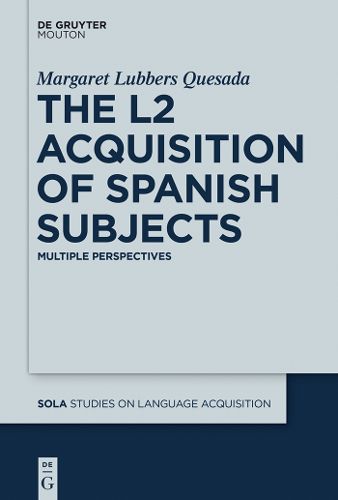Readings Newsletter
Become a Readings Member to make your shopping experience even easier.
Sign in or sign up for free!
You’re not far away from qualifying for FREE standard shipping within Australia
You’ve qualified for FREE standard shipping within Australia
The cart is loading…






This title is printed to order. This book may have been self-published. If so, we cannot guarantee the quality of the content. In the main most books will have gone through the editing process however some may not. We therefore suggest that you be aware of this before ordering this book. If in doubt check either the author or publisher’s details as we are unable to accept any returns unless they are faulty. Please contact us if you have any questions.
There is a long overdue need to address the sharp philosophical and methodological divide between formal/generative and functional/discourse perspectives in contemporary theoretical linguistics and L2 acquisition. Language structure in general, and the use of subjects in particular, is dependent upon multiple syntactic, lexico-semantic, and discourse-pragmatic factors. Therefore, the study of L2 acquisition must be equally multi-faceted.
This volume examines data from over twenty years of research in the L2 acquisition of Spanish subjects from several theoretical perspectives, including generative approaches, processing theory, discourse-pragmatics and sociolinguistic-variationist models. By so doing, the author seeks to fulfill two principal objectives: the first is to determine the many linguistic and extra-linguistic properties of Spanish subjects that constrain their acquisition and use; and the second is to establish common ground among researchers from varied theoretical persuasions in acquisition studies. The author argues throughout the volume that central to native speaker use and L2 acquisition are universal properties ranging from highly specific syntactic principles to more general characteristics of human cognition and a range of these properties is responsible for language acquisition. An examination of the diverse body of research that considers a wider scope of universal properties of language can thus bring us closer to a unified account of the L2 acquisition of Spanish subject expression.
$9.00 standard shipping within Australia
FREE standard shipping within Australia for orders over $100.00
Express & International shipping calculated at checkout
This title is printed to order. This book may have been self-published. If so, we cannot guarantee the quality of the content. In the main most books will have gone through the editing process however some may not. We therefore suggest that you be aware of this before ordering this book. If in doubt check either the author or publisher’s details as we are unable to accept any returns unless they are faulty. Please contact us if you have any questions.
There is a long overdue need to address the sharp philosophical and methodological divide between formal/generative and functional/discourse perspectives in contemporary theoretical linguistics and L2 acquisition. Language structure in general, and the use of subjects in particular, is dependent upon multiple syntactic, lexico-semantic, and discourse-pragmatic factors. Therefore, the study of L2 acquisition must be equally multi-faceted.
This volume examines data from over twenty years of research in the L2 acquisition of Spanish subjects from several theoretical perspectives, including generative approaches, processing theory, discourse-pragmatics and sociolinguistic-variationist models. By so doing, the author seeks to fulfill two principal objectives: the first is to determine the many linguistic and extra-linguistic properties of Spanish subjects that constrain their acquisition and use; and the second is to establish common ground among researchers from varied theoretical persuasions in acquisition studies. The author argues throughout the volume that central to native speaker use and L2 acquisition are universal properties ranging from highly specific syntactic principles to more general characteristics of human cognition and a range of these properties is responsible for language acquisition. An examination of the diverse body of research that considers a wider scope of universal properties of language can thus bring us closer to a unified account of the L2 acquisition of Spanish subject expression.